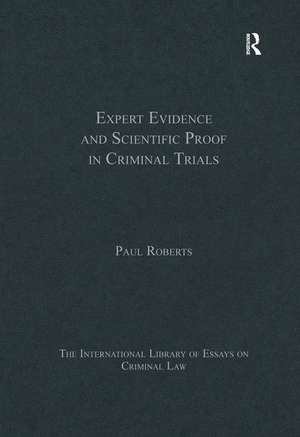Expert Evidence and Scientific Proof in Criminal Trials: The International Library of Essays on Criminal Law
Autor Paul Robertsen Limba Engleză Hardback – 13 noi 2014
Preț: 2120.25 lei
Preț vechi: 3036.27 lei
-30% Nou
Puncte Express: 3180
Preț estimativ în valută:
405.76€ • 440.59$ • 340.84£
405.76€ • 440.59$ • 340.84£
Carte tipărită la comandă
Livrare economică 23 aprilie-07 mai
Preluare comenzi: 021 569.72.76
Specificații
ISBN-13: 9781409466062
ISBN-10: 140946606X
Pagini: 664
Dimensiuni: 169 x 244 x 43 mm
Greutate: 1.56 kg
Ediția:1
Editura: Taylor & Francis
Colecția Routledge
Seria The International Library of Essays on Criminal Law
Locul publicării:Oxford, United Kingdom
ISBN-10: 140946606X
Pagini: 664
Dimensiuni: 169 x 244 x 43 mm
Greutate: 1.56 kg
Ediția:1
Editura: Taylor & Francis
Colecția Routledge
Seria The International Library of Essays on Criminal Law
Locul publicării:Oxford, United Kingdom
Cuprins
Contents: Introduction. Part I Interdisciplinary ‘Forensic Science’ - Theoretical Foundations: Historical and practical considerations regarding expert testimony, Learned Hand; A just measure of science, David Nelken; Science and technology studies on trial: dilemmas of expertise, Michael Lynch and Simon Cole; Of truth, in science and in law, Susan Haack; The irrelevance, and central relevance, of the boundary between science and non-science in the evaluation of expert witness reliability, D. Michael Risinger. Part II Expert Evidence in Criminal Proceedings: Fingerprint evidence in an age of DNA profiling, Jennifer L. Mnookin; Science in the criminal process, Paul Roberts; ‘Junk science’: the criminal cases, Paul C. Giannelli; Sounding out expert voice identification, David Ormerod; Atkins v The Emperor: the ‘cautious’ use of unreliable ‘expert’ opinion, Gary Edmond, Richard Kemp, Glenn Porter, David Hamer, Mike Burton, Katherine Biber and Mehera San Roque; Forensic science evidence in question, Mike Redmayne, Paul Roberts, Colin Aitken and Graham Jackson. Part III Interpreting Forensic Science Evidence: A framework for analysis, Erica Beecher-Monas; The vision in ‘blind’ justice: expert perception, judgment, and visual cognition in forensic pattern recognition, Itiel E. Dror and Simon A. Cole; Forensic identification: from a faith-based ‘science’ to a scientific science, Michael J. Saks; Interpretation of statistical evidence in criminal trials: the prosecutor’s fallacy and the defense attorney’s fallacy, William C. Thompson and Edward L. Schumann; Presenting probabilities in court: the DNA experience, Mike Redmayne; Communicating opinion evidence in the forensic identification sciences: accuracy and impact, Dawn McQuiston-Surrett and Michael J. Saks; She blinded me with science: wrongful convictions and the ‘reverse CSI-effect’, Mark A. Godsey and Marie Alou. Part IV Procedural Reform in Comparative Perspective: The psychiatric expert in court, Anthony Kenny; Expertise and the Daubert decision, Ronald J. Allen; Eyes wide shut: hidden problems and future consequences of the fact-based validity standard, Joëlle Anne Moreno; Daubert, Schmaubert: criminal defendants and the short end of the science stick, Susan D. Rozelle; The Law Commission’s report on expert evidence in criminal proceedings, Gary Edmond and Andrew Roberts; Expert evidence and the Law Commission: implementation without legislation?, Tony Ward; Court experts and expert witnesses: have we a lesson to learn from the French?, J.R. Spencer; Forensic science in inquisitorial systems of criminal justice, Bron McKillop. Name index.
Notă biografică
Paul Roberts is Professor of Criminal Jurisprudence in the University of Nottingham School of Law, and an Adjunct Professor in the University of New South Wales Faculty of Law. His extensive publications, spanning criminal evidence and procedure, forensic science and expert witness testimony, criminal law theory, and international and comparative criminal justice, include Roberts and Zuckerman, Criminal Evidence (OUP, 2/e 2010), Roberts and Hunter (eds), Criminal Evidence and Human Rights (Hart, 2012) and Roberts and Redmayne (eds), Innovations in Evidence and Proof (Hart, 2007). He has been visiting professor or invited lecturer at the China University of Political Science and Law (CUPL), Beijing; the International Islamic University Malaysia (IIUM); the University of Warsaw; the Jagiellonian University in Krakow; the University of Gottingen; and the University of Natal (Pietermaritzburg), RSA. He has served as an advisor to the English and Scottish Law Commissions, and to the Forensic Regulator, and is a member of the International Association of Evidence Science.
Descriere
Forensic science evidence and expert witness testimony play an increasingly prominent role in modern criminal proceedings. Science produces powerful evidence of criminal offending, but has also courted controversy and sometimes contributed towards miscarriages of justice. The twenty-six articles and essays reproduced in this volume explore the theoretical foundations of modern scientific proof and critically consider the practical issues to which expert evidence gives rise in contemporary criminal trials. The essays are prefaced by a substantial new introduction which provides an overview and incisive commentary contextualising the key debates.






